
Are you ready to revolutionize your writing process and unlock unparalleled creativity?
Embrace the future of writing today with our cutting-edge AI-powered tools! Designed to enhance your creativity, streamline your workflow, and facilitate collaboration, our suite of services is the key to transforming your writing journey.
The writing industry is undergoing a significant transformation, where Artificial Intelligence (AI) is merging with traditional practices to enhance creativity and streamline workflows. Established writers are using AI not to replace their creativity but to augment it, facilitating idea generation, breaking creative blocks, and encouraging collaboration. This integration of AI into writing is revolutionizing the process, promising greater efficiency and a more cooperative environment while maintaining the importance of personal style and authenticity. As AI continues to intertwine with writing, it opens up a future filled with innovative possibilities, marking an exciting era for writers ready to explore this transformative journey.
Table of Contents
- Introduction: The Fusion of Innovation and Tradition in the Writing World
- The Rise of AI: A Game-Changer for Established Writers
- Enhancing Creativity: How AI Tools Are Sparking New Ideas
- Streamlining the Writing Process: AI's Impact on Efficiency and Productivity
- From Research to Editing: AI-Powered Tools That Support Established Writers
- Maintaining Authenticity: Balancing AI Assistance with Personal Writing Style
- Overcoming Writer's Block: AI's Role in Overcoming Creative Hurdles
- Collaborative Writing: AI's Potential in Facilitating Teamwork Among Established Writers
- The Future of Writing: Exploring the Possibilities of AI in the Literary World
- Final Thoughts
Introduction: The Fusion of Innovation and Tradition in the Writing World
Innovation and tradition may seem like opposing forces, but in the world of writing, they are merging to create a powerful synergy. Established writers, who have long relied on their creativity and expertise, are now embracing the use of Artificial Intelligence (AI) to revolutionize their writing process. AI isn't replacing these writers; instead, it's enhancing their abilities, streamlining their work, and opening up new possibilities. This article explores how AI is transforming the writing process for established writers, from sparking new ideas to overcoming creative hurdles and facilitating collaboration.
The Rise of AI: A Game-Changer for Established Writers
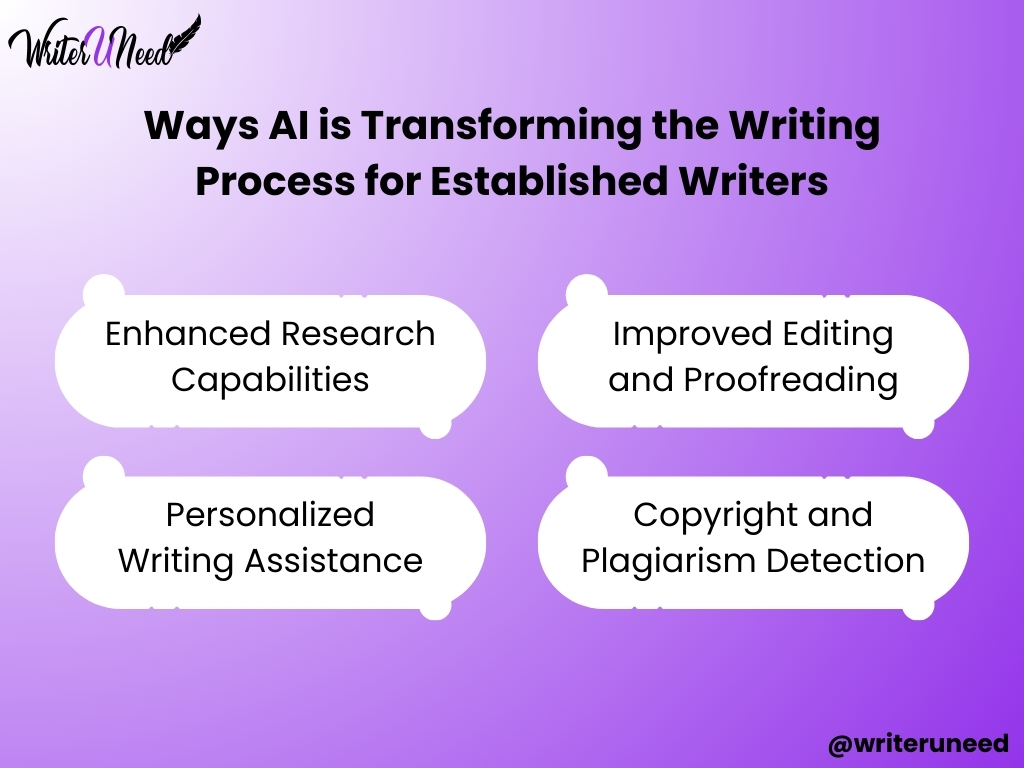
AI has made significant strides in recent years, and its impact on the writing industry cannot be ignored. According to a report by Gartner, by 2022, 20% of all business content will be authored by machines. This rise of AI-powered writing tools is not limited to business content; it's also transforming the way established writers work.
Here are the 10 Ways AI is Transforming the Writing Process for Established Writers:
- Enhanced Research Capabilities: AI can process and analyze vast amounts of data much faster than a human, making the research process quicker and more comprehensive. Established writers can use AI tools to sift through extensive archives, scientific papers, or data repositories, allowing them to enrich their narratives with detailed, accurate information without spending months on research
- Improved Editing and Proofreading: AI-powered editing tools can go beyond basic grammar and spell check to offer stylistic suggestions, improve readability, and even suggest more vivid or precise wording. This can significantly reduce the editing workload of writers, freeing them up to focus more on content creation and storytelling.
- Personalized Writing Assistance: AI can learn an individual writer's style and preferences, offering personalized writing assistance. This could mean suggesting sentence structures, words, or even ideas that fit the writer’s unique style, making the writing process more efficient and the final product more consistent.
- Automated Content Generation for Routine Tasks: Established writers often spend considerable time on routine writing tasks such as emails, social media updates, or blog posts. AI can automate these tasks, generating high-quality content in the writer's voice, allowing them to devote more time to their primary writing projects.
- Collaborative Writing with AI: AI can act as a writing partner, suggesting plot developments, character arcs, or even alternative endings. This can be particularly useful for writers experiencing writer’s block or looking to explore new creative directions.
- Translation and Localization: AI-powered translation tools can help writers reach a global audience by making it easier and more cost-effective to translate their work into multiple languages. Moreover, AI can adapt content to fit cultural nuances, making stories more accessible and relatable to people from different backgrounds.
- Market Analysis and Trend Prediction: AI can analyze reading trends and market demands, helping writers to tailor their work to current or emerging trends. This can be invaluable for writers looking to increase their work's commercial success or reach a wider audience.
- Voice-activated Writing: For writers who prefer speaking to typing, AI-powered voice recognition software can transcribe ideas with high accuracy. This can speed up the writing process and make it more accessible, especially for those with physical limitations.
- Interactive Storytelling: AI can enable new forms of storytelling, such as interactive novels or stories that adapt to readers' choices. Established writers can use AI to create complex narrative branches without losing track of the overall story structure.
- Copyright and Plagiarism Detection: AI tools can help writers protect their work by scanning the internet for unauthorized copies or instances of plagiarism. This ensures that their intellectual property remains secure and their rights are upheld.
In conclusion, the rise of AI offers established writers a plethora of tools and opportunities to enhance their craft, improve efficiency, and explore new creative avenues. Embracing these technologies can help writers stay competitive and innovative in a rapidly evolving industry.
Enhancing Creativity: How AI Tools Are Sparking New Ideas
One of the most exciting aspects of AI in the writing process is its ability to enhance creativity. AI-powered tools can analyze vast amounts of data, including books, articles, and other written works, to generate new ideas and insights. For example, tools like OpenAI's GPT-3 can generate coherent and creative text based on a given prompt. Established writers can use these tools to overcome creative blocks, explore new genres, or experiment with different writing styles.
Here are the 10 Ways AI is Revolutionizing Creative Writing and Storytelling:
- Creative Brainstorming Assistants: AI tools can serve as brainstorming partners, offering a multitude of ideas or angles on a given topic. For writers, this could mean generating a diverse array of plot ideas, character traits, or even settings based on a single prompt. This aids in expanding the writer's creative horizon beyond their usual thought patterns.
- Style Imitation for Skill Development: AI can analyze the writing style of various authors and generate text mimicking those styles. Writers can use this feature to practice writing in different styles, enhancing their versatility and skill. This could be particularly useful for ghostwriters or those looking to diversify their portfolio.
- Automated Research Assistant: For non-fiction writers, AI can quickly sift through vast databases to find relevant information on any given topic. This reduces the time spent on research, allowing writers to focus more on the creative aspects of their work. It can also suggest connections or themes that the writer might not have considered.
- Dynamic Plot Development: AI tools can suggest plot developments or twists based on the current narrative structure of a story. This can help writers who are stuck at a particular point in their story to find exciting ways to move forward.
- Character Development Aids: By analyzing character traits, backgrounds, and arcs, AI can suggest complex, multi-dimensional characters. This can be especially useful in genres like fantasy or science fiction, where character creation can be particularly challenging.
- Emotional Tone Analysis: AI can analyze a piece of writing to suggest adjustments in tone to better convey emotions or to maintain consistency throughout a narrative. This can help writers in refining their work to evoke the desired response from their readers.
- Genre Exploration Tools: AI can help writers explore new genres by providing insights into the key elements that define them. This could include generating sample texts or providing a breakdown of common tropes and themes within a genre.
- Collaborative Writing Platforms: AI-powered platforms can facilitate collaborative writing, where the AI not only contributes ideas but also helps in merging different writing styles cohesively. This could pave the way for new forms of collaborative storytelling that were previously difficult to achieve.
- Language Skill Enhancement: For writers looking to write in a non-native language, AI can provide real-time suggestions for grammar, vocabulary, and idioms. This lowers the barrier to entry for writing in new languages and expands the potential audience for their work.
- Feedback and Revision Assistant: AI tools can offer constructive feedback on drafts, pointing out areas for improvement, suggesting alternative phrasing, or highlighting passages that may confuse readers. This can serve as an initial round of editing before human review, streamlining the revision process.
These applications of AI in the writing process not only make the task of writing more efficient but also open up new avenues for creativity and exploration. As these tools continue to evolve, the potential for innovative storytelling and content creation is boundless.
Streamlining the Writing Process: AI's Impact on Efficiency and Productivity
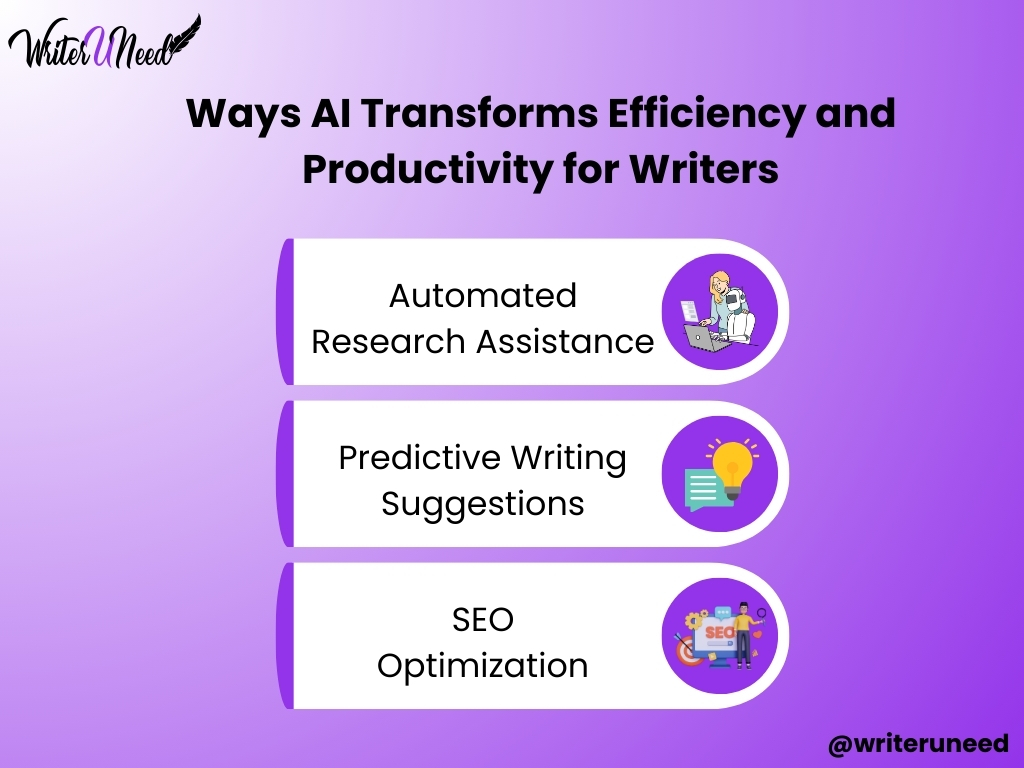
Writing is a time-consuming process that requires research, organization, and revision. AI-powered tools can significantly streamline this process, saving established writers valuable time and effort. For instance, AI algorithms can quickly sift through vast amounts of information to provide relevant research material, eliminating the need for manual searching. Additionally, AI-powered writing assistants can help with grammar, style, and structure, ensuring that the final product is polished and error-free.
Here are the 10 Ways AI Transforms Efficiency and Productivity for Writers:
- Automated Research Assistance: AI can revolutionize how writers conduct research by using natural language processing (NLP) to understand the context of a writer's needs and deliver precise, relevant information from a vast database of sources. This not only speeds up the research phase but ensures the data's accuracy and relevance.
- Predictive Writing Suggestions: Leveraging machine learning, AI tools can offer predictive text options that help flesh out sentences and paragraphs, based on the context and content that the writer has already produced. This can significantly speed up the writing process and aid in overcoming writer's block.
- Adaptive Tone and Style Guidelines: AI can analyze the intended audience and purpose of a piece of writing and suggest adjustments to tone, style, and vocabulary to match. This adaptability can help writers create content that resonates more effectively with their target readership, enhancing engagement and readability.
- Real-Time Grammar and Syntax Correction: Beyond simple spell-checking, AI-powered tools can offer real-time suggestions for grammatical corrections, syntax improvements, and stylistic enhancements, making the editing process faster and more efficient.
- Content Structuring Assistance: AI can help writers structure their content more effectively by suggesting an optimal flow based on the key points that need to be covered. This could include offering outlines or frameworks tailored to the specific type of writing, whether it's an academic paper, a blog post, or a novel.
- Plagiarism Detection and Originality Enhancement: Advanced AI tools can scan a piece of writing to detect any potential plagiarism and suggest changes to ensure originality. This is crucial for maintaining the integrity and credibility of the content.
- Automated Content Summarization: AI can provide concise summaries of long texts, research papers, or articles, enabling writers to quickly understand and reference key points without having to sift through the entire document.
- Emotion and Sentiment Analysis: For content that seeks to evoke specific emotions or reactions, AI tools can analyze the writing for its emotional tone and suggest adjustments to better align with the desired impact.
- SEO Optimization: AI can assist writers in optimizing their content for search engines by suggesting keywords, analyzing the competitiveness of topics, and recommending improvements to increase visibility online.
- Collaborative Writing Platforms: AI can facilitate smoother collaboration among multiple writers or editors by tracking changes, suggesting consensus-based edits, and managing version control, making the collaborative process more seamless and productive.
These innovations not only make the writing process more efficient but also enhance the quality of the final product, allowing writers to focus more on the creative aspects of their work while leaving the tedious and time-consuming tasks to AI.
From Research to Editing: AI-Powered Tools That Support Established Writers
AI is not limited to just generating ideas or improving grammar. It can also assist established writers in various stages of the writing process. For example, tools like Grammarly can provide real-time suggestions for improving sentence structure, word choice, and overall readability. Similarly, AI-powered research tools like IBM's Watson can analyze and summarize complex information, making it easier for writers to incorporate accurate and relevant data into their work.
Here are the 10 AI-Powered Innovations Transforming the Writing Process for Established Authors:
- Enhanced Research Capabilities with AI Summarization Tools: Beyond IBM's Watson, AI tools like OpenAI's GPT models could summarize academic papers, reports, and articles, enabling writers to quickly grasp complex subjects and integrate them into their narratives without spending hours in research.
- Contextual Thesaurus and Style Suggestion: AI can analyze the context of a piece of writing and suggest stylistic improvements, including more vivid or precise vocabulary, ensuring that the writer's tone and style are consistent throughout their work.
- Dynamic Plot Development Tools: For fiction writers, AI can suggest plot developments or twists based on the current storyline, character arcs, and genre conventions, helping writers overcome writer’s block and enrich their narratives.
- Automated Fact-Checking and Source Verification: AI tools can instantly verify facts and check the credibility of sources cited in a manuscript, ensuring the accuracy of non-fiction writing, historical novels, or journalistic pieces.
- Sentiment Analysis for Emotional Impact: AI can evaluate the emotional impact of certain scenes or chapters, providing writers with insights into how their work might be perceived by readers, and suggesting modifications to enhance the desired emotional response.
- Voice and Tone Adjustment Tools: AI can help writers adjust the voice and tone of their manuscript to better fit their target audience or genre, whether it's making a young adult novel sound more authentic or ensuring a technical manual is appropriately formal.
- Predictive Text and Auto-Completion for Efficiency: Leveraging machine learning, AI can predict the writer's next words or sentences based on context, significantly speeding up the writing process while maintaining the writer's unique style and voice.
- Interactive Character and World-Building Aids: AI can assist in developing complex characters and settings by suggesting background details, personality traits, or world-building elements, making these aspects more consistent and believable.
- Accessibility Features for Writers with Disabilities: AI-powered tools can transcribe speech to text, offer voice-controlled writing and editing, and provide other accessibility features, making writing more inclusive for individuals with disabilities.
- Personalized Writing Coach and Feedback System: An AI system could act as a personalized writing coach, offering constructive feedback on manuscripts, pointing out areas for improvement, and even suggesting exercises to enhance certain writing skills.
These AI-powered tools not only streamline the writing process but also open new avenues for creativity and precision, enabling established writers to produce richer, more compelling work with greater efficiency.
Maintaining Authenticity: Balancing AI Assistance with Personal Writing Style
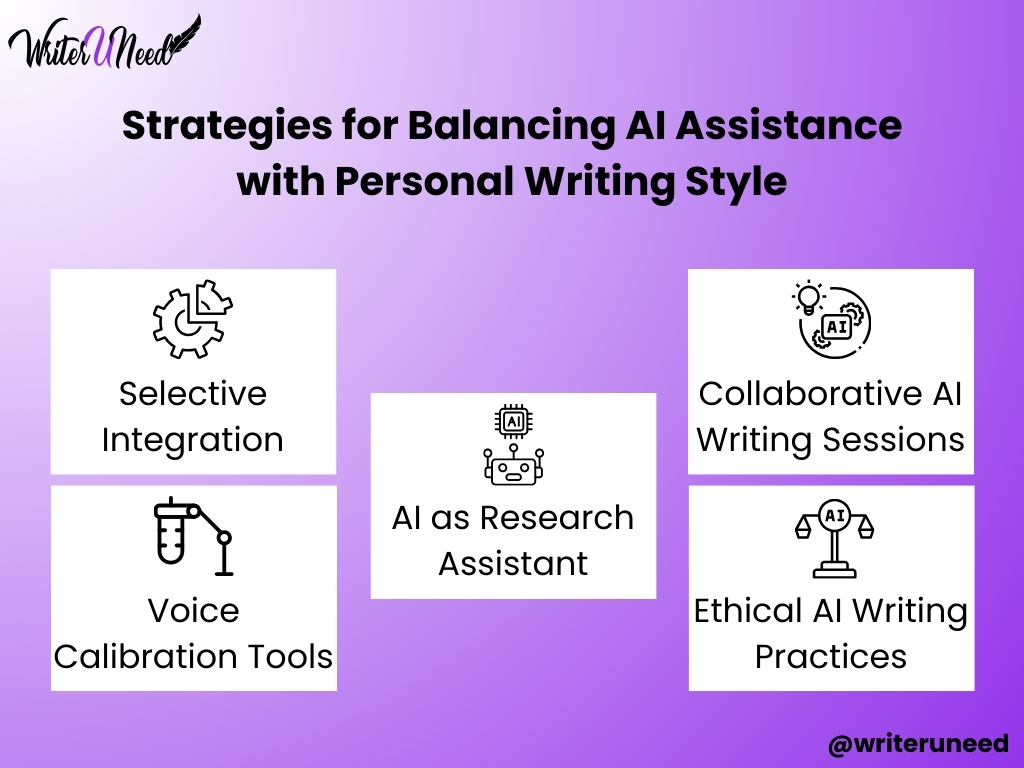
While AI tools can be incredibly helpful, established writers must strike a balance between utilizing AI assistance and maintaining their unique writing style and voice. AI should be seen as a tool, not a replacement for human creativity. Writers must use their judgment to decide when and how to incorporate AI-generated ideas or suggestions while staying true to their artistic vision.
Here are the 10 Strategies for Balancing AI Assistance with Personal Writing Style:
- Selective Integration: Encourage writers to use AI for brainstorming and overcoming writer’s block but emphasize the importance of rewriting AI-generated content in their voice. This ensures that the core ideas might be AI-assisted, but the execution is authentically theirs.
- Voice Calibration Tools: Recommend the development or use of advanced AI tools designed to learn and mimic a writer's style and voice. Writers can feed these tools with their works, helping the AI understand and replicate their style, ensuring that any AI assistance closely matches their unique voice.
- AI as Research Assistant: Position AI as a tool for research, fact-checking, and data analysis rather than direct content creation. This allows writers to enrich their narratives with accurate and comprehensive information without compromising their writing style.
- Customizable AI Settings: Promote AI tools that offer customization options where writers can set parameters for tone, style, and even thematic elements. This ensures that AI-generated suggestions or drafts are more aligned with the writer’s personal style, requiring less adjustment.
- AI for Non-Creative Tasks: Encourage the use of AI for editing, grammar checks, and formatting tasks. This allows writers to focus on the creative aspects of writing, leveraging AI for time-consuming but necessary tasks without impacting their personal voice.
- Collaborative AI Writing Sessions: Advocate for sessions where writers use AI live, treating it as a collaborative partner. This process involves actively deciding which suggestions align with their vision and which don’t, making the writer’s personal style the final filter.
- Ethical AI Writing Practices: Educate writers on the ethical considerations of using AI, including transparency about AI-assisted passages and understanding the limitations of AI in capturing human emotions and experiences, reinforcing the value of human touch in writing.
- Hybrid Writing Workshops: Develop workshops that focus on the synergistic combination of AI tools and personal writing styles. These sessions can help writers understand how to effectively blend AI-generated content with their narrative voice.
- AI Feedback Loops: Implement feedback mechanisms where AI learns from the writer's edits and preferences over time, thus gradually enhancing its ability to produce more personalized suggestions that respect the writer's unique style.
- Narrative Analytics: Utilize AI tools that provide analytics on writing style, such as sentence structure, word choice, and thematic consistency. Writers can use these insights to ensure that even with AI assistance, their work remains consistent with their signature style across different pieces.
By adopting these strategies, writers can leverage AI to enhance their creative process while preserving the authenticity and integrity of their personal writing style.
Overcoming Writer's Block: AI's Role in Overcoming Creative Hurdles
Writer's block is a common challenge that established writers face. AI can play a crucial role in overcoming this hurdle by providing fresh perspectives and generating new ideas. By using AI-powered tools, writers can break free from creative stagnation and find inspiration in unexpected places. AI algorithms can analyze successful works in a specific genre and provide insights into popular themes, character development, or narrative structures, helping writers overcome creative blocks.
Here are the 10 AI-Powered Solutions for Breaking Through Writer's Block and Elevating Creativity:
- Idea Generation Engines: Develop AI platforms that serve as brainstorming partners, suggesting original concepts, plot twists, or character traits based on the writer’s input and preferences. These engines can analyze trends in literature and generate ideas that are both current and innovative.
- AI Writing Prompts: Create AI systems that produce customized writing prompts for writers. By inputting genre, tone, and key themes, writers can receive unique prompts designed to spark creativity and guide them out of a creative rut.
- Interactive Story Development Tools: Implement AI tools that help writers develop their stories interactively. These tools could suggest alternative story arcs, unexpected character developments, or even propose side plots, allowing writers to explore new directions in their work.
- Dynamic Character Creation Assistants: Design AI that helps in creating deep, multifaceted characters by suggesting complex backgrounds, motivations, and personality traits. This could be based on psychological theories, literature archetypes, or successful character studies from bestselling novels.
- Emotion-Powered Writing Suggestions: Utilize AI to analyze the emotional journey of a story and provide suggestions on how to enhance emotional impact at key moments. By understanding the narrative’s emotional flow, writers can adjust pacing, dialogue, and description to maximize reader engagement.
- Genre Innovation Labs: Offer AI-powered analysis tools that dissect successful works in various genres to identify emerging trends and underexplored niches. Writers can use these insights to position their work at the forefront of literary innovation.
- Narrative Structure Optimizers: Employ AI to suggest improvements in narrative structure, ensuring that the story maintains tension and interest. This could involve rearranging scenes, adjusting the pacing, or highlighting areas where the narrative might lag.
- Semantic Expansion Tools: Introduce AI systems that help writers explore new linguistic territories by suggesting synonyms, metaphors, and similes that enrich the text without losing the original tone or voice. This not only helps in overcoming writer’s block but also enhances the writer’s style.
- Cross-Disciplinary Inspiration Portals: Develop AI tools that draw connections between literature and other disciplines like psychology, philosophy, or science, to provide writers with fresh perspectives and ideas. This interdisciplinary approach can open new avenues for creativity.
- Automated Research Assistants: Craft AI assistants that can perform background research for writers, digging into historical contexts, scientific explanations, or cultural insights relevant to the story. By automating the research process, writers can focus more on the creative aspects of their work.
By leveraging AI in these ways, writers can not only navigate through the challenges of writer’s block but also elevate their creative process, producing work that is innovative, engaging, and resonant with readers.
Collaborative Writing: AI's Potential in Facilitating Teamwork Among Established Writers
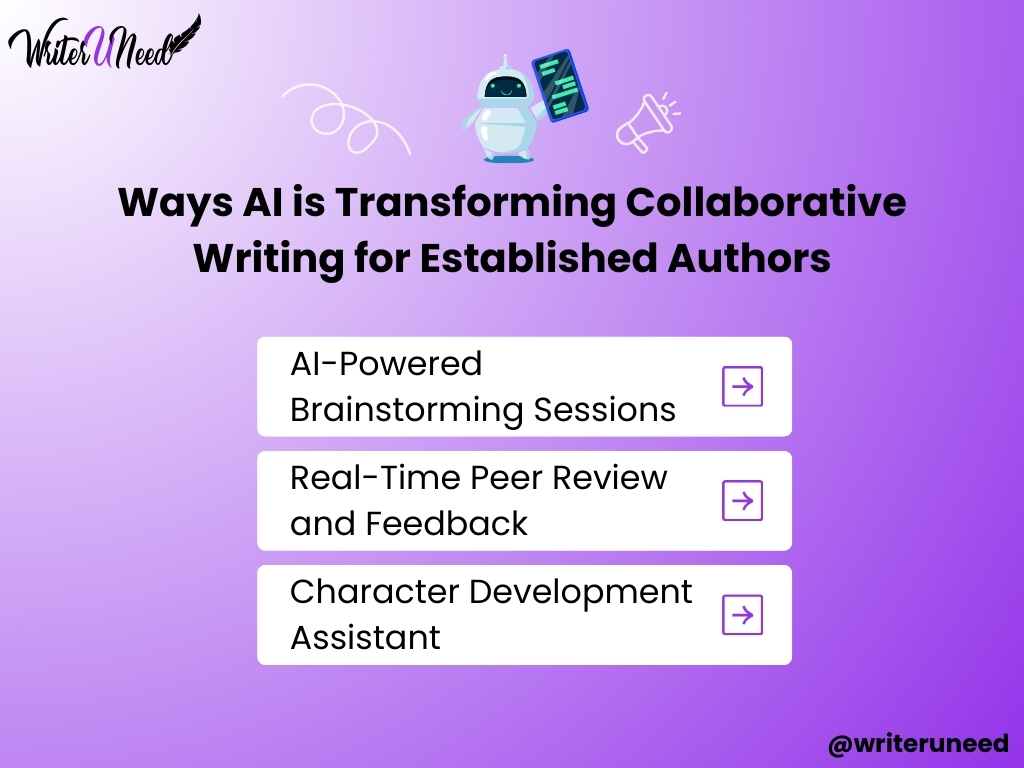
Writing is often a solitary endeavor, but AI has the potential to facilitate collaboration among established writers. AI-powered tools can assist in co-writing projects by suggesting edits, providing real-time feedback, or even simulating the writing style of a specific author. This collaboration can lead to the creation of unique and innovative works that blend the strengths of multiple writers.
Here are the 10 Ways AI is Transforming Collaborative Writing for Established Authors:
- AI-Powered Brainstorming Sessions: Utilizing AI to conduct virtual brainstorming sessions where writers can input their ideas and the AI suggests connections, expansions, or entirely new concepts that align with the collective theme. This can help in creating a cohesive narrative that incorporates the best elements from each writer.
- Style Alignment Tools: Developing AI tools that analyze the writing styles of each participant in a collaborative project to suggest edits that make the narrative more seamless. This could involve recommending adjustments to match tone, pacing, or vocabulary, ensuring the final product feels like a unified work rather than a disjointed collection of contributions.
- Dynamic Plot Development: AI can assist in plot development by suggesting twists, conflicts, or resolutions based on the current storyline, character arcs, and thematic elements. This could be particularly useful in collaborative fiction writing, where maintaining consistency and momentum is crucial.
- Real-Time Peer Review and Feedback: Implementing AI systems that facilitate real-time feedback among writers, highlighting areas of improvement, inconsistencies, or suggesting enhancements. This could streamline the editing process and ensure all voices are heard and considered equally.
- Virtual Writing Retreats: Developing virtual environments powered by AI where writers can collaborate in real-time, no matter their physical location. These platforms can simulate various writing environments, from quiet libraries to inspiring landscapes, tailored to the preferences of the group.
- AI as a Mediator for Creative Differences: Leveraging AI to mediate when creative differences arise, suggesting compromises or alternative directions that satisfy all parties involved. This could help maintain harmony within the group and keep the project moving forward.
- Character Development Assistant: Crafting AI tools that assist in developing complex, multi-dimensional characters by suggesting backstories, character traits, or growth arcs based on the narrative needs and the writers' inputs. This collaborative approach to character creation can add depth and diversity to the story.
- Cross-Genre Innovation: Utilizing AI to merge different genres in innovative ways, guided by the inputs of writers specializing in those genres. This could lead to the creation of groundbreaking works that appeal to a wider audience by blending elements of science fiction, romance, mystery, and more.
- Automated Research Assistant: Deploying AI to assist in the research process, gathering relevant information, historical context, or scientific data necessary for the story. This can save time and ensure accuracy, allowing writers to focus more on the creative aspects of writing.
- Interactive Storytelling Platforms: Creating AI-driven platforms where collaborative stories can evolve based on reader feedback. Writers can adjust plotlines, characters, or settings in real time, making the readers active participants in the storytelling process. This could revolutionize the way stories are told and experienced, making them more immersive and interactive.
The Future of Writing: Exploring the Possibilities of AI in the Literary World
The integration of AI into the writing process is just the beginning. As AI technology continues to advance, the possibilities for its application in the literary world are endless. For instance, AI could be used to create personalized reading experiences by tailoring content to individual preferences or even generating entirely new works based on a reader's interests. Additionally, AI could assist in the translation of literary works, making literature more accessible to a global audience.
Here are the 10 Revolutionary AI Applications Transforming the Literary Landscape:
- AI-Assisted Writing Platforms: Future platforms could offer real-time suggestions for plot development, character arcs, and dialogue improvements based on successful literary patterns. This could significantly reduce writer's block and improve the quality of output for both novice and experienced writers.
- Dynamic Storytelling: AI could enable stories that evolve based on reader choices, similar to a choose-your-own-adventure book but with infinite paths. The AI could generate responses to reader decisions in real-time, creating a unique narrative experience for each reader.
- Personalized Literature: Imagine a service where AI creates stories tailored specifically to an individual's preferences, background, and current mood. This could extend to educational texts, making learning more engaging by incorporating the student's interests into the material.
- Cross-Cultural and Language Translation: AI could bridge the gap between languages and cultures by providing nuanced translations that capture the essence and subtleties of the original text. This would expand the audience for regional literature and foster a greater understanding among diverse cultures.
- Automated Research: For historical fiction and other research-intensive writing, AI could automate the process of gathering and synthesizing information, allowing writers to focus more on narrative and character development rather than spending extensive time on background research.
- Enhanced Editorial Tools: Beyond simple grammar and spell checks, future AI tools could offer deep editorial suggestions, such as pointing out plot inconsistencies, pacing issues, or underdeveloped characters, thereby streamlining the editing process.
- Voice-Generated Narratives: By analyzing a person's spoken stories or ideas, AI could generate written narratives, enabling a new form of storytelling that captures the essence of oral traditions and makes writing more accessible to those who may not have the skill or ability to write traditionally.
- AI-Powered Literary Analysis: AI could offer insights into literature by analyzing themes, motifs, and character development across vast libraries of text, providing readers and scholars with a deeper understanding of literary works and trends over time.
- Virtual Reality (VR) and Augmented Reality (AR) Literature: Combining AI with VR/AR technology could create immersive reading experiences where the environment and characters come to life around the reader, potentially redefining the act of reading itself.
- Ethical and Creative AI Writing Partnerships: As AI becomes more sophisticated, the potential for collaboration between human authors and AI could lead to entirely new genres and forms of literature. These partnerships would need to navigate ethical considerations around authorship and creativity but could push the boundaries of storytelling to new horizons.
Final Thoughts
The fusion of innovation and tradition in the writing world is an exciting development for established writers. AI-powered tools are revolutionizing the writing process by enhancing creativity, streamlining efficiency, and facilitating collaboration. However, it is essential for writers to maintain their authenticity and use AI as a tool rather than a replacement for human creativity. As AI technology continues to evolve, the future of writing holds immense potential for innovation and growth. Established writers who embrace AI as a partner in their creative journey will undoubtedly find themselves at the forefront of this exciting revolution.
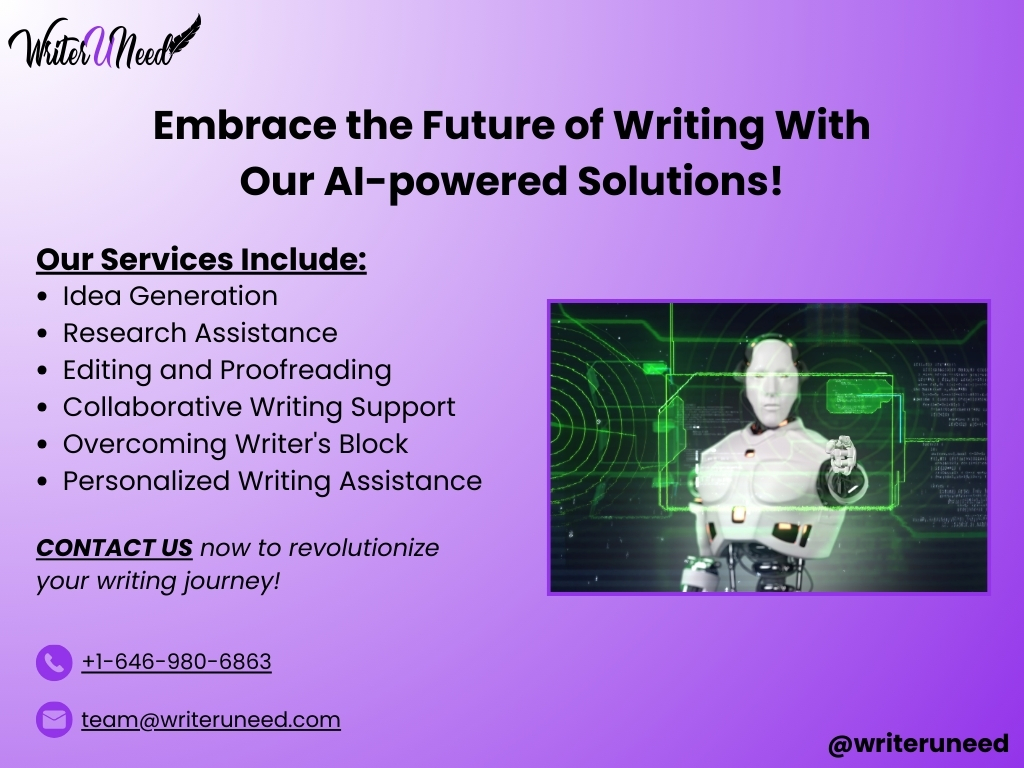
Join the revolution of innovation and tradition in the writing world. Embrace AI as a partner in your creative journey and stand at the forefront of this exciting evolution.
Contact us today and begin your journey toward writing excellence. Your masterpiece awaits!











